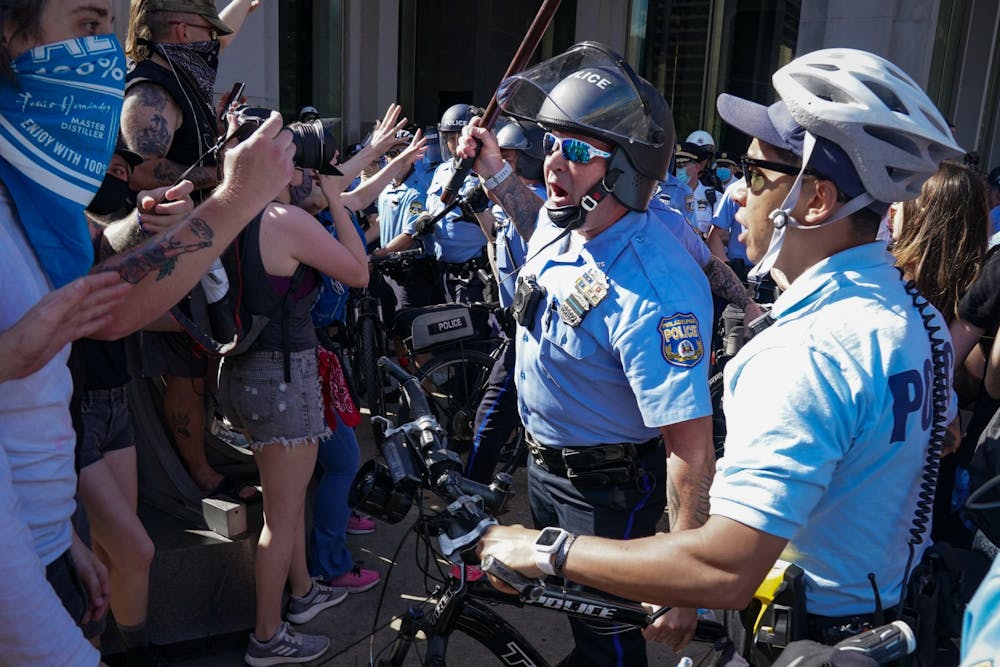The average high school food fight scene in movies is pop culture royalty. We all love the triumphant moment a burger flies across the room. However, the spontaneous food fight at my high school didn’t quite play out the same. On the sidelines of the sandwich and milk throwing, I observed what was happening, without direct involvement or distraction. Within a few minutes, I noticed a swarm of police vehicles heading towards our school.
I remember feeling frightened by the unprecedented amount of cars and trucks coming at us. As the officers stormed into our lunchroom, they began slamming students, at random, to the ground. No questions were asked — chaos erupted. Students began to run and scatter throughout the halls. Our school immediately went on lockdown. Inside my classroom, the loud pounding of footsteps, circulating throughout the hallways, went on for what felt like forever. My teacher didn’t attempt to instruct us. Our high school, filled with children, mimicked a high security prison.
For the following weeks, everyone talked about the excessiveness and brutality of that day. Many students were arrested. Some were expelled. The day became infamous. Most of my thoughts focused on how quickly the police dominated our school over a playful, nonviolent, food fight. Teenage me was unaware of the damaged culture and frequent viciousness attached to policing. My imagination told me they would exert that same superiority against the bad guys, if that day ever came around.
Police brutality has been making headlines for decades. A Penn graduate's front teeth were knocked out at a recent protest. At another Philadelphia protest, a Temple student was bludgeoned in the head by a Philadelphia police officer. After being held in custody for over forty hours, he required ten staples at a local hospital. He plans to pursue a civil rights lawsuit. The attacking officer, later charged with aggravated assault, received an outpour of local support when turning himself into authorities.
It is naive to believe a policing system that was built on racism and subjugation would be fair in a nation that continues to suffer with systemic racial oppression. Our policing system has never been fair, it has never represented justice for all, and it will continue to be riddled with injustices until radical change occurs. Recent videos provide proof of how these atrocities continue to occur.
Over decades, police brutality continues to be accepted in Philadelphia. The Penn community is currently evaluating the University’s role in city-wide policing through the funding Penn provides to the police. So far, thousands have signed a petition asking Penn to stop funding the Philadelphia Police Foundation, as the funds support a "racist, fascist police state."
Earlier this month, police officers in Fishtown stood and watched armed vigilantes openly demonstrate violence against protestors supporting the Black Lives Matter movement. Their violence is a reminder that white supremacy dwells in Philadelphia. In 1985, Philadelphia police deliberately burned 11 people alive when they dropped a bomb on a house being occupied by the Black liberation group, MOVE. Five of the lives lost that day were innocent children. The police commissioner at the time, Gregore Sambor, gave orders to “let the fire burn." These horrific events occurred just a few blocks away from Penn.
The policing system is broken in Philadelphia and throughout the United States. The only way to obtain the power to stop brutal police killings is by overturning what we know. Change begins with abolition. We cannot reform a system that is doing what it was intended to do — hunt and kill Black people. Our inherently flawed system of policing, the system that has taken my friends and loved ones, must stop breathing. A new system that unites around equitable public safety and accountability must take its place.

JESSICA GOODING is a rising College senior from Philadelphia, Pennsylvania studying History and English. Her email address is jgooding@sas.upenn.edu.









